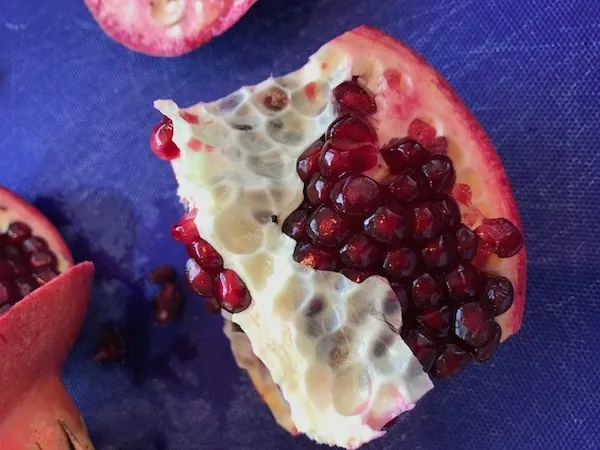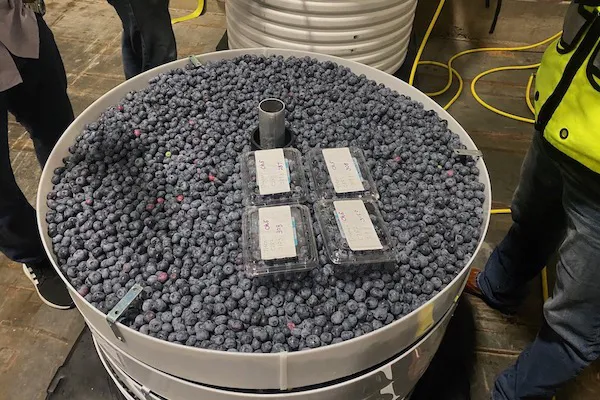After years of extensive trialing, RipeLocker containers, which work to extend the post-harvest life of perishables, will be released for commercial use this summer. George Lobisser, co-founder and CEO of RipeLocker explains how the technology works, and why it will make a splash on the global market with its release this year.

Pomegranates after being in a RipeLocker container for 6 months.
The perfect balance
The lid is placed on the RipeLocker container after the grower has packed their products. Then, the container is remotely programmed by the RipeLocker team and the vacuum starts to create the perfect combination of oxygen (O2), carbon dioxide (CO2) and pressure inside the container. Lobisser explains: “The regular air that we breathe has about 21% O2 in it, and controlled atmosphere storage rooms have around 2% O2 in it; the RipeLocker has only a fraction of that. The low amount of O2 slows down the respiration rate of the product, basically putting it to sleep. The key is to get the perfect balance here: too little O2 and you get an anaerobic environment which would choke the product, too much O2 and the container isn’t doing its job of extending shelf-lives. But with the perfect balance, the RipeLocker works to extend the shelf-life of perishables while maintaining their optimal quality.”
The environment created inside the containers aids the perishable product in other ways as well. Lobisser says: “Lower pressure means less dense air, which means that the volatiles generated by the fruit are able to leave the fruit instantly. The low amount of O2 also works to suppress harmful pathogens, such as botrytis, found on berries. In the vacuum, these pathogens can’t grow.” In addition to these factors, the air inside the container is also fully saturated. “This means that the product can’t transpire, and the water molecules will remain inside the product because they have nowhere else to go. The combination of these technologies has made it possible for us to keep blueberries for up to three months in optimal condition,” Lobisser explains.
Years of efficacy trials
While the benefits of the RipeLocker containers reach everyone in the supply chain – down to the consumer who is able to keep their produce fresh in their refrigerators for longer – the company’s main focus is on the growers and packers of the industry. “Everything revolves around them and they are who we want to make happy. The only way you’ll accomplish that is through efficacy: show them that the product works and that the value it brings will outweigh the cost,” says Lobisser. “We have done numerous trials over the past years to ensure the efficacy and value of the product. We work directly with growers and many times outside research universities are brought in as third parties to analyze the results – Washington State University is evaluating the results of our trials on cherries, and Wageningen University in the Netherlands is working on the trials we are doing with papayas in Brazil. We are proud to be presenting this product that is based on science and conduct trials with growers, packers and major research universities,” he adds.
 During the trials, the company works to find that perfect balance for each perishable – that balance between O2, CO2 and pressure that will keep each specific product at its optimal shelf-life and quality during storage or throughout its journey through the supply chain. “For cherries, for example, it took us years to find the perfect formula. This is because growers wanted to be able to hold the cherries for 60 days, and by the time that we completed the trial, the cherry season was over so we could not source more cherries. So, if the results weren’t exactly what we were looking for, then we would have to wait until the following year to try again. Over the past two to four years, we have run trials to ensure that we find that perfect formula for each product – and we have found it for blueberries, cherries, pomegranates, papayas, mangoes, fresh hops and fresh-cut flowers,” Lobisser shares.
During the trials, the company works to find that perfect balance for each perishable – that balance between O2, CO2 and pressure that will keep each specific product at its optimal shelf-life and quality during storage or throughout its journey through the supply chain. “For cherries, for example, it took us years to find the perfect formula. This is because growers wanted to be able to hold the cherries for 60 days, and by the time that we completed the trial, the cherry season was over so we could not source more cherries. So, if the results weren’t exactly what we were looking for, then we would have to wait until the following year to try again. Over the past two to four years, we have run trials to ensure that we find that perfect formula for each product – and we have found it for blueberries, cherries, pomegranates, papayas, mangoes, fresh hops and fresh-cut flowers,” Lobisser shares.
Right: George Lobisser, co-founder and CEO of RipeLocker.
Constant monitoring throughout the journey
After the product is packed in the RipeLocker containers, the vacuum is activated and the perfect atmospheric balance is achieved inside, the product is ready for storage or transit to its final destination. “The containers are designed to fit in a 44 x 44 inch footprint, and they are stackable as well. This allows them to be palletized inside the trucks and ocean shipping containers. The design of the inside of the container depends on the product that will be shipped in it – the containers for blueberries, for example, have many shelves so that the berries won’t crush each other,” Lobisser explains.
While on their journey, the RipeLocker system constantly monitors the air inside to ensure that the balance remains just right. “It will measure the O2 and CO2 levels inside and make adjustments where necessary. One time during one of our blueberry trials, the refrigeration in our Sprinter van we were storing the containers in failed temporarily and the inside of the van got up to 60 degrees Fahrenheit – but the RipeLocker adjusted accordingly, allowing more O2 inside to make up for the higher levels of respiration in the blueberries. When we delivered the product to the grower at the end of the trial, the blueberries remained in top condition. Without the RipeLocker containers, the blueberries would have turned to absolute mush during the refrigeration fail,” says Lobisser.

Blueberry Hill blueberries after being in the RipeLocker container for 8 weeks.
Sustainability and other goals
With the shelf-life of highly perishable products extended far beyond the usual, growers are able to ship their products through ocean freight rather than airfreight using the RipeLocker containers. “This has enormous benefits for everyone,” says Lobisser. “Not only does that bring price reductions, which will mean more profit for the grower but also lower prices for the end consumer. In addition, the CO2 emissions are also greatly reduced when opting for ocean over air shipping. Airfreight for a ton of produce generates 44 times more CO2 than ocean freight, so using RipeLocker containers allows for much greener logistics. Additionally, the RipeLocker is constructed of recyclable materials, and is reusable. Finally, using RipeLocker also helps to cut down on food waste at multiple levels of the supply chain by ensuring that the product will arrive at its destination at top quality and that retailers and consumers can store it for longer before it goes bad,” he adds.
In addition to the sustainability goals, RipeLocker was also created with some other goals in mind. “Our goal really is the common industry goal we all share: to deliver higher quality produce with less waste. There are a lot of products out there that work to achieve this, but one of the ways in which RipeLocker is unique is that it works on berries. Berries aren’t line-processed because they are so fragile, so they can’t be treated with any sprays or coating products that work to extend shelf-life and reduce perishability. Our technology is the only one on the market that works for berries,” says Lobisser, continuing: “Additionally, the RipeLocker helps the grower extend their season, hopefully allowing them to generate greater margins – our trials have shown, for example, that California growers will be able to sell their pomegranates into March and April, which is unprecedented. And because the RipeLocker is a chemical-free solution, it is applicable to any product – whether organic or conventional – in any country, no matter their regulations with regard to chemicals. It’s a global, sustainable solution designed to benefit everyone in the supply chain,” Lobisser concludes.
 For more information:
For more information:
RipeLocker
Email: sales@ripelocker.com
www.ripelocker.com
